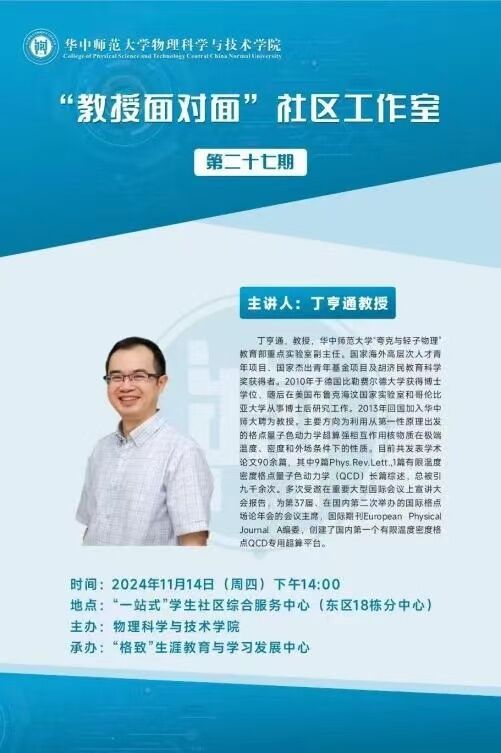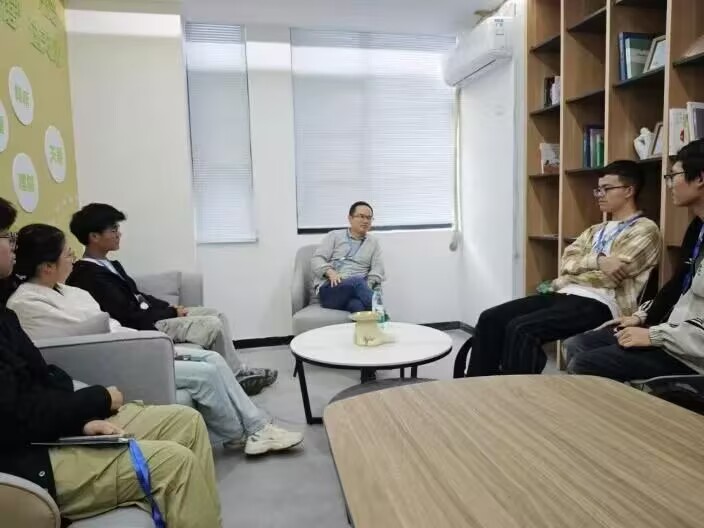The Voice of CCNU On the afternoon of November 14th, the 27th session of the "Professors Face to Face" community event organized by College of Physical Science and Technology took place in the community studio of Building 18 in the eastern district of the university. Professor Ding Hengtong held a special seminar with five students from different grades.


Introduction to the Professor
Ding Hengtong, Professor, is the Deputy Director of the Ministry of Education's Key Laboratory of Quark and Lepton Physics at Central China Normal University. He is also the winner of the National Overseas High-level Talents Youth Program, the National Outstanding Youth Fund and the Hu Jimin Educational Science Award. He obtained his Ph.D. from Bielefeld University in Germany in 2010 and then conducted postdoctoral research at Brookhaven National Laboratory and Columbia University in the United States. In 2013, he returned to China and was appointed as a professor at Central China Normal University. His main research focus is on the properties of strongly interacting nuclear matter under extreme temperature, density, and external field conditions, utilizing lattice quantum chromodynamics (QCD) from first principles with supercomputing. He has published over 90 academic papers, including 9 in Physical Review Letters and 1 comprehensive review on finite temperature and density lattice quantum chromodynamics (QCD), with a total citation count exceeding 9,000. He has been invited multiple times to give keynote speeches at important international conferences, served as the conference chair for the 37th International Lattice Field Theory Conference, which was held for the second time in China and an editorial board member of the international journal European Physical Journal A. He also established the first domestic supercomputing platform specifically for finite temperature and density lattice QCD.
Content of the discussion
Professor Ding began the session by warmly inviting each student to introduce themselves one by one, creating a cozy atmosphere. He demonstrated immense patience in listening to each student's speech and provided comprehensive, detailed, and accessible answers to the various questions raised by the students, drawing on his extensive knowledge and rich life experience. He encouraged the students to always maintain a heart for continuous learning in this temple of knowledge—university, strive tirelessly to climb to the peak of knowledge with unwavering determination. He also inspired everyone to keep passionate about knowledge and persistent in the pursuit of truth, so that they could continuously broaden their horizons, deepen the boundaries of knowledge and pave a solid and broad road for their future life journey.
Professor Ding stated that university was a stage which nurtured infinite possibilities and showcased a vast world. On this stage, students shouldn't fear failure but should rely on their courage, wisdom and perseverance to take the first step boldly, to try bravely, and to seize and create opportunities actively. He encouraged everyone not to be bound by traditional thinking patterns and concepts, but to dare to break the rules and pioneering innovate so that they could shine their own light on this stage full of hope.
Regarding the issue of " how college students can effectively improve themselves ", Professor Ding shared his unique insights. He emphasized that keeping a diary was an extremely beneficial habit. Through daily self-feedback and profound reflection, we could gradually enhance our personal abilities. This process, though seemingly slow, was like the constant dripping that wore away the stone and would eventually show its profound impact. In the university environment which is full of opportunities and challenges, the standard of excellence was far more than just academic performance. It covered a broader range of dimensions. In interactions with others, he pointed out that we should have discerning eyes, be good at discovering and appreciating the shining points and excellent qualities in others. At the same time, we should also actively establish connections with more outstanding people, using this as a ladder for self-improvement. He encouraged students to find like-minded partners, form study groups or discussion circles together. Through mutual supervision and encouragement, they could collide with sparks of thought in discussions, thereby exercising and enhancing their expressive abilities and teamwork skills.
In addition, Professor Ding suggested that students should be brave in trying to participate in various campus activities and social practices within the limits of their energy. This could not only help everyone to discover their true interests but also transform valuable experiences into profound insights after each activity. Integrating these insights into daily life and guiding practical actions was the key to achieving continuous growth and self-transcendence.
Finally, in response to the students' question of "how can college students manage their time well", Professor Ding replied," Focusing intently on one thing for a whole period of time is the key to improving efficiency. To complete a task efficiently, it often requires a significant amount of time and full concentration. We should plan our time well so that every period can fully realize its value."
Source: College of Physical Science and Technology of CCNU
Traslator: Yuan Yanglei
Date: December 5, 2024

